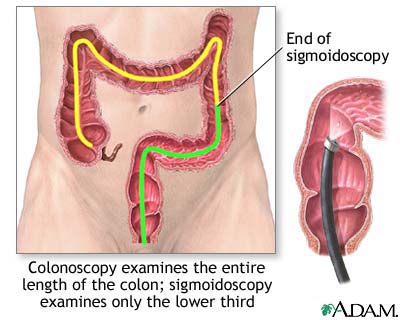Treatment
The goals of treatment are to:
- Control the acute attacks
- Prevent repeated attacks
- Help the colon heal
Hospitalization is often required for severe attacks. Your doctor may prescribe corticosteroids to reduce inflammation. You may be given nutrients through an intravenous (IV) line (through a vein).
DIET AND NUTRITION
Certain types of foods may worsen diarrhea and gas symptoms, especially during times of active disease. Diet suggestions:
- Eat small amounts of food throughout the day.
- Drink lots of water (frequent consumption of small amounts throughout the day).
- Avoid high-fiber foods (bran, beans, nuts, seeds, and popcorn).
- Avoid fatty greasy or fried foods and sauces (butter, margarine, and heavy cream).
- Limit milk products if you are lactose intolerant,. Dairy products are a good source of protein and calcium.
- Avoid or limit alcohol and caffeine.
MEDICATIONS
Medications that may be used to decrease the number of attacks include:
- 5-aminosalicylates such as mesalamine or sulfazine
- Immunomodulators such as azathioprine and 6-mercaptopurine
- Corticosteroids (prednisone and methylprednisolone) taken by mouth during a flareup or as a rectal suppository, foam, or enema
- Infliximab (Remicade) to treat patients who do not respond to other medications
SURGERY
Surgery to remove the colon will cure ulcerative colitis and removes the threat of colon cancer. Surgery is usually for patients who have:
- Colitis that does not respond to complete medical therapy
- Changes in the lining of their colon that are felt to be precancerous.
- Serious complications such as rupture (perforation) of the colon, severe bleeding (hemorrhage), or toxic megacolon
Most of the time, the entire colon, including the rectum, is removed. Afterwards, patients may need an ileoostomy (a surgical opening in the abdominal wall), or a procedure that connects the small intestine to the anus to help the patient gain more normal bowel function.
See also:
- Total prolectomy with ileostomy
- Total proctolectomy and ileal-anal pouch
Support Groups
Social support can often help with the stress of dealing with illness, and support group members may also have useful tips for finding the best treatment and coping with the condition.
For more information visit the Crohn’s and Colitis Foundation of America (CCFA) web site at www.ccfa.org.
Prognosis (Expectations)
About half of patients with ulcerative colitis have mild symptoms. Patients with more severe ulcerative colitis tend to respond less well to medications.
Permanent and complete control of symptoms with medications is unusual. Cure is only possible through complete removal of the large intestine.
The risk of colon cancer increases in each decade after ulcerative colitis is diagnosed.
Complications
- Ankylosing spondylitis
- Blood clots
- Colorectal cancer
- Colon narrowing
- Complications of corticosteroid therapy
- Impaired growth and sexual development in children
- Inflammation of the joints (arthritis)
- Lesions in the eye
- Liver disease
- Massive bleeding in the colon
- Mouth ulcers
- Pyoderma gangrenosum (skin ulcer)
- Tears or holes (perforation) in the colon
Calling Your Health Care Provider
Call your health care provider if you develop persistent abdominal pain, new or increased bleeding, persistent fever, or other symptoms of ulcerative colitis.
Call your health care provider if you have ulcerative colitis and your symptoms worsen or do not improve with treatment, or if new symptoms develop.
Pictures & Images
Colonoscopy
-
Ulcerative colitis: Overview, Causes
-
Ulcerative colitis: Symptoms & Signs
-
Ulcerative colitis: Treatment
Review Date : 10/18/2009
Reviewed By : David Zieve, MD, MHA, Medical Director, A.D.A.M., Inc., and George F Longstreth, MD, Department of Gastroenterology, Kaiser Permanente Medical Care Program San Diego, California. Also reviewed by David Zieve, MD, MHA, Medical Director, A.D.A.M., Inc.
